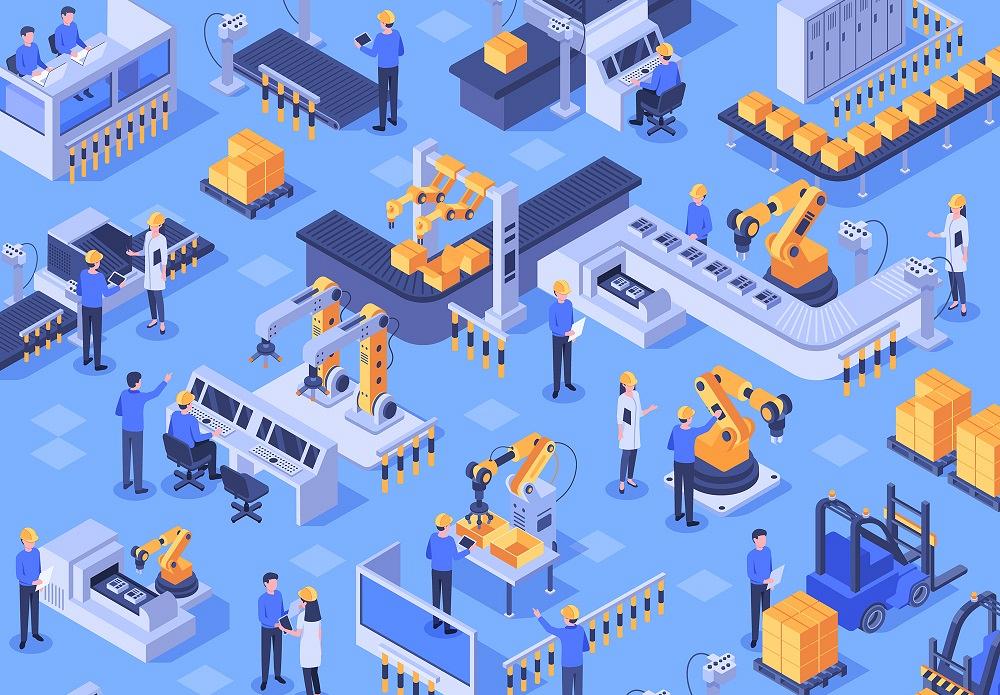Editor-in-Chief
- FMA
- The Fabricator
- FABTECH
- Canadian Metalworking
Categories
- Additive Manufacturing
- Aluminum Welding
- Arc Welding
- Assembly and Joining
- Automation and Robotics
- Bending and Forming
- Consumables
- Cutting and Weld Prep
- Electric Vehicles
- En Español
- Finishing
- Hydroforming
- Laser Cutting
- Laser Welding
- Machining
- Manufacturing Software
- Materials Handling
- Metals/Materials
- Oxyfuel Cutting
- Plasma Cutting
- Power Tools
- Punching and Other Holemaking
- Roll Forming
- Safety
- Sawing
- Shearing
- Shop Management
- Testing and Measuring
- Tube and Pipe Fabrication
- Tube and Pipe Production
- Waterjet Cutting
Industry Directory
Webcasts
Podcasts
FAB 40
Advertise
Subscribe
Account Login
Search
The magic of reinvention in metal fabricating
The nature of fab shops gives them the ability to change focus quickly, and that can be a great thing
- By Dan Davis
- February 25, 2020

Metal fabricating companies are all about speed of delivery. It makes sense then that they also can shift gears quickly and refocus the business in a manner of time that other companies simply can’t match. Getty Images
Career changes are not easy to pull off. Older workers expect a certain salary commensurate with their experience, and relocation might not be easy because of a working spouse, children in school, or even elderly parents who need support. That leads to people staying in jobs perhaps longer than they anticipated.
The Bureau of Labor Statistics (BLS) report bears this out. According to a January 2018 survey, sponsored by the U.S. Department of Labor's Chief Evaluation Office, older workers are much more likely than younger workers to have tenure with the same employer. For instance, the survey revealed that 47% of workers ages 50 to 54 were employed for at least 10 years with their current employer in January 2018, compared with 2% of those ages 25 to 29.
In the world of metal fabricating, experience doesn’t get in the way of major change. In fact, it makes it all the more possible. For example, consider this quick turnaround story. Kernersville, N.C.-based US Duct, a manufacturer of ducting, fittings, industrial ventilation systems, and tubing products, purchased a stamping operation in Archdale, N.C., that was about to close. It relaunched the company as US Metal Crafters and with a new business strategy: It wanted to be the metal fabricating service provider for the largest manufacturing OEMs in the area and beyond, if necessary.
In two years the company’s new focus was paying off. It added metal fabricating capabilities to its in-house tool- and diemaking and repair business and stamping business. Now it is working with some of the largest multinational companies in the world. The shop is no longer entertaining the local “inventor” who was looking for someone to build a prototype of his doohickey. US Metal Crafters has remade itself into the metal fabricating expert for its customers that are more interested in assembling a final product than fabricating one from the ground up.
Shickel Corp., Bridgewater, Va., is another example. The metal fabricator has made the transition over the last decade from being a shop that split its business between stainless steel work for nearby food processing and pharmaceutical manufacturing facilities and structural, architectural, and ornamental metals for large construction projects to one that predominantly focuses on the latter now. Mark Shickel, the company’s president, said the variety of projects that the company takes on are challenging, but still fun.
In particular, he said that they’ve learned a lot about delivering different types of finishes that aren’t easily described on a blueprint. They know they are close when the customer literally says, “That’s it!” during a visit, Shickel said.
Of course, these two companies are different in their business approaches. One is pretty much a startup with an aggressive business plan, and the other is just over 80 years old. One wants to take on contract work from high-profile OEMs, and the other wants high-profile jobs with general contractors and design houses of all sizes.
But they both have metal fabricating capabilities that have allowed them to reinvent themselves. They still bend, cut, form, and weld metal; they just happen to be doing it for different customers.
That type of adaptability keeps a metal fabricating company from getting stale. If business is slow in the construction segment, a shop can start prospecting in other areas, such as agriculture or transportation. If a fabricator takes on stainless steel work and likes the challenge, it might attend a food equipment or food processing industry tradeshow to make some potential contacts. If a shop finds that it’s spending a lot of time fabricating aftermarket parts for friends’ trucks, maybe that fabricator can build a product line and start another business.
Metal fabricating skills travel. While they may not be the ticket to a lifestyle of the rich and famous, those skills do guarantee a life rich with different types of experiences. Fabricators literally help to build a better world.
That says something about the trade that many people don’t grasp until they are in it. It’s refreshing. Every day is a new adventure.
That’s probably one of the reasons that the aforementioned BLS report shows that, in the private sector, manufacturing was one of two industry segments where employees had been with their current employer more than five years. (The other was mining.) That might not seem like a long tenure, but it’s more than double that of workers in leisure and hospitality, which had the lowest median tenure (2.2 years).
You aren’t going to get bored working in a metal fabricating shop. The nature of the job guarantees that.
subscribe now

The Fabricator is North America's leading magazine for the metal forming and fabricating industry. The magazine delivers the news, technical articles, and case histories that enable fabricators to do their jobs more efficiently. The Fabricator has served the industry since 1970.
start your free subscriptionAbout the Author

Dan Davis
2135 Point Blvd.
Elgin, IL 60123
815-227-8281
Dan Davis is editor-in-chief of The Fabricator, the industry's most widely circulated metal fabricating magazine, and its sister publications, The Tube & Pipe Journal and The Welder. He has been with the publications since April 2002.
Related Companies
- Stay connected from anywhere

Easily access valuable industry resources now with full access to the digital edition of The Fabricator.

Easily access valuable industry resources now with full access to the digital edition of The Welder.

Easily access valuable industry resources now with full access to the digital edition of The Tube and Pipe Journal.
- Podcasting
- Podcast:
- The Fabricator Podcast
- Published:
- 04/16/2024
- Running Time:
- 63:29
In this episode of The Fabricator Podcast, Caleb Chamberlain, co-founder and CEO of OSH Cut, discusses his company’s...
- Industry Events
16th Annual Safety Conference
- April 30 - May 1, 2024
- Elgin,
Pipe and Tube Conference
- May 21 - 22, 2024
- Omaha, NE
World-Class Roll Forming Workshop
- June 5 - 6, 2024
- Louisville, KY
Advanced Laser Application Workshop
- June 25 - 27, 2024
- Novi, MI































